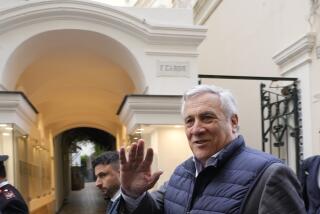Group of Seven Ready to Aid Currency Markets : Economy: But U.S. and foreign officials say the euphoric response to the coalition’s initial success in the Mideast has meant that no action is necessary.
NEW YORK — Top economic officials of the United States and the other major industrial nations announced Monday that they are prepared to intervene in world currency markets to help stabilize the dollar if the war in the Persian Gulf sours but said so far they see no need to do so.
In a communique issued after an unusual two-day session in New York, the Group of Seven, as it is known informally, said it had agreed to step in if necessary to ensure that financial markets are orderly as the war in the gulf progresses.
But U.S. and foreign officials alike said the euphoric response by the financial markets to the initial successes of the U.S.-led coalition in its war with Iraq has meant that no action is necessary. They said none of the countries has intervened since the war began.
U.S. Treasury Secretary Nicholas F. Brady said the finance ministers would continue to monitor the global markets and would be ready to move if setbacks in the war cause panic in the markets.
“The best way to characterize (what they agreed to do) was that the phone lines will be open,” Brady said. “If there are unusual turns in the market, then the ministers will get on the phone and talk about it.”
Meanwhile, officials said the Group of Seven governments also have put on hold any plans to approve the Soviet Union for membership in the key international financial organizations, such as the International Monetary Fund, in the wake of the Soviet crackdown in the Baltics.
In recent months, the United States and several European nations have been studying whether to extend the Soviets’ membership in the IMF, the World Bank and other international economic organizations.
But officials indicated Monday that those plans have been put on the back burner following the Soviets’ brutal clampdowns in Lithuania and Latvia in recent days.
“Events (in the Soviet Union) are moving so fast that we will just have to wait and see how events play out before deciding whether to extend the Soviets an offer of IMF membership,” Brady said. “It doesn’t make sense to do anything now before we see what is going on there.”
The group, which includes financial ministers and central bankers representing the United States, Germany, Japan, Britain, France, Canada and Italy, appeared satisfied Monday that the global financial markets were functioning well.
A senior Administration official said there was agreement among the finance ministers that the markets had responded in an orderly way. “That orderly pattern is something we want to see continued,” he said, “and we don’t want to do anything to upset it.’
Clearly, the ministers have been surprised, along with other observers, by the overwhelmingly optimistic response of the financial markets to the war.
Earlier, the group had been prepared to discuss how to deal with soaring oil prices brought on by the gulf conflict. Yet, oil prices have fallen sharply in the wake of the early allied successes.
While some analysts have been concerned that the decline in the value of the dollar may make it more difficult for the United States to attract foreign investors, and thus make it harder to finance the war effort, Brady said he sees no need now to prop up the dollar.
He said the U.S. currency has remained relatively stable since the war began.
Brady also repeated his longstanding belief that he doesn’t believe that it is up to the Administration to try to determine the value of the dollar in any event.
“Nobody is smart enough to know where the dollar is supposed to go,” Brady told reporters. “We will watch it.”
Brady also told the ministers that he agrees with forecasts predicting that the U.S. economy will pull out of the recession by midsummer.
More to Read
Sign up for Essential California
The most important California stories and recommendations in your inbox every morning.
You may occasionally receive promotional content from the Los Angeles Times.










